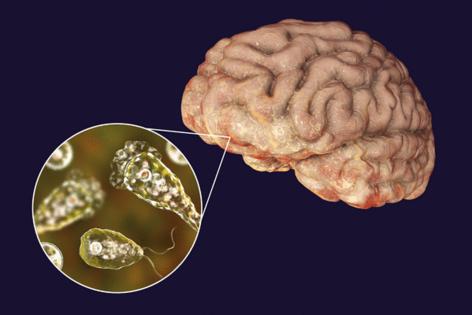Man infected by brain-eating amoeba in Lake of the Ozarks has died
Published in Science & Technology News
ST. LOUIS — A man battling a rare brain infection from an amoeba in Lake of the Ozarks has died, state health officials confirmed Wednesday.
The man died Tuesday at a St. Louis area hospital. No other information was provided.
“We extend our deepest condolences to the loved ones of the patient,” read a news release by the Missouri Department of Health and Senior Services.
The man was infected after water skiing at the lake during the first week of August. A laboratory confirmed the cause was Naegleria fowleri, a microscopic amoeba commonly found in warm fresh water such as lakes and ponds.
He had been hospitalized since Aug. 10. His symptoms began two days earlier, health officials said.
People are infected when water containing the parasite enters the body through the nose, usually while victims are swimming or diving.
“It has to involve some pretty forceful water going up the sinuses,” said Nathan Koffarnus, an epidemiologist with DHSS.
The infection can cause primary amebic meningoencephalitis, a destruction of brain tissue. Early symptoms of the condition include headache, fever and nausea, but it quickly leads to severe brain damage.
The condition is rare. Between 1962 and 2024, there were 167 reported cases in the United States, according to the Centers for Disease Control and Prevention. And it is almost always deadly. Only four of those infected survived.
The last Missouri resident to die from the brain-eating infection was in July 2022, after they swam in Lake of Three Fires in southwestern Iowa. The resident’s age was not released. The only other case identified among Missouri residents occurred in 1987, according to state health officials.
Koffarnus urged people to take precautions, such as keeping your head out of the water when swimming. The amoeba is particularly active when water temperatures exceed 77 degrees.
“This is an organism that we could find in just about any freshwater source, especially this time of year when the water is so warm,” Koffarnus said. “The general guidance is to consider that it’s probably present and to take precautionary measures.”
To help protect yourself against a Naegleria fowleri infection, the CDC suggests:
— Hold your nose or wear a nose clip if you are jumping or diving into fresh water.
— Always keep your head above water in hot springs.
— Don’t dive in shallow water because the amoeba is more likely to live there.
— Use distilled or boiled tap water when rinsing your sinuses or cleansing your nasal passages.
The CDC reports that a few infections have occurred when people used tap water that contained the amoeba to rinse their sinuses or cleanse their nasal passages.
In very rare instances, people have become infected from recreational spots like splash pads and a surf park that did not have enough chlorine.
_____
©2025 STLtoday.com. Distributed by Tribune Content Agency, LLC.







Comments